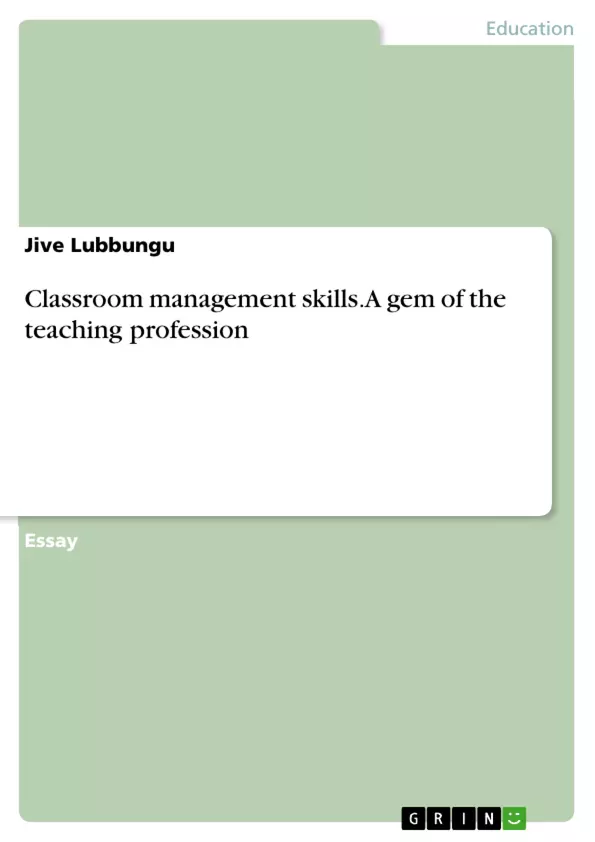This article focuses on classroom management skills in schools. Class management is an important component of any successful lesson delivery. A teacher of any subject does not only need to be thoroughly knowledgeable in the subject they are handling but also need to know how to control a class and maintain discipline and order in it. In a nutshell, a teacher needs to possess class management skills. Drawing from the above, this article deals with five of the many classroom management techniques concerning what the author observed in the field while monitoring student teachers. The study was carried out in selected schools in central and Southern provinces in Zambia. Being a qualitative study, interviews, a document study, and observation instruments were used to collect data. The study revealed that there is a fair relationship between teachers and learners, inconsistency in maintaining authority, lack of preparedness, lack of accommodating all learners, and lack of patience among teachers. The study takes a thematic analysis of the findings and recommends that teachers need to include classroom management skills in their Professional Continuous Development (CPD) activities to equip each other with management techniques.
Keywords: Classroom management, skills, teaching, schools, equip.
Inhaltsverzeichnis (Table of Contents)
- Introduction
- Management skills
- Cultivating a Healthy Relationship with the Learners
- Adequate Lesson Preparation
- Accommodating All Learners
- Maintain Authority all year long
- Patience
Zielsetzung und Themenschwerpunkte (Objectives and Key Themes)
This article aims to highlight the importance of classroom management skills for teachers in ensuring effective learning environments and fostering positive student growth. It examines five key classroom management techniques observed in a study conducted in Zambia, focusing on real-world experiences of student teachers.
- The Significance of Classroom Management
- Developing Strong Teacher-Student Relationships
- The Role of Adequate Lesson Preparation
- Accommodating Diverse Learning Needs
- Maintaining Classroom Authority and Discipline
Zusammenfassung der Kapitel (Chapter Summaries)
The introduction underscores the often overlooked significance of classroom management, arguing that it goes beyond simple discipline and plays a crucial role in fostering both academic and social-moral development. It criticizes the common practice of teachers neglecting class management in their lesson evaluations.
The article then delves into five key classroom management skills, drawing upon the author's observations of student teachers in Zambia. The first skill, cultivating healthy relationships with learners, emphasizes the importance of building trust and fostering a sense of community within the classroom. The second skill, adequate lesson preparation, stresses the necessity of thoughtful planning and preparation to create engaging and effective lessons.
The third skill, accommodating all learners, focuses on the importance of individualizing instruction to meet the diverse needs of students. The fourth skill, maintaining authority throughout the year, emphasizes the need for teachers to establish clear expectations and consistently uphold rules and boundaries. The final skill, patience, highlights the importance of teachers remaining calm and composed in challenging situations and using positive reinforcement to manage student behavior.
Schlüsselwörter (Keywords)
This article primarily focuses on classroom management, teacher-student relationships, lesson preparation, diverse learning needs, authority, patience, and student behavior.
Frequently Asked Questions
Why is classroom management essential for effective teaching?
Classroom management goes beyond discipline; it creates an environment where academic and social development can occur. Even a subject expert cannot teach effectively without maintaining order and a positive atmosphere.
What are the five key classroom management skills discussed?
The skills include cultivating healthy teacher-student relationships, adequate lesson preparation, accommodating all learners, maintaining authority consistently, and practicing patience.
How does lesson preparation affect classroom discipline?
Adequate preparation ensures that lessons are engaging and flow smoothly, which reduces the likelihood of students becoming distracted or disruptive due to boredom or lack of direction.
What role does patience play in teaching?
Patience allows teachers to remain calm in challenging situations, using positive reinforcement rather than reactive punishment to manage student behavior effectively.
What did the study in Zambia reveal about teacher-learner relationships?
The study found a fair relationship but highlighted issues such as inconsistency in maintaining authority, lack of preparedness, and a failure to accommodate the diverse needs of all learners.
- Citation du texte
- Jive Lubbungu (Auteur), 2020, Classroom management skills. A gem of the teaching profession, Munich, GRIN Verlag, https://www.grin.com/document/941956



